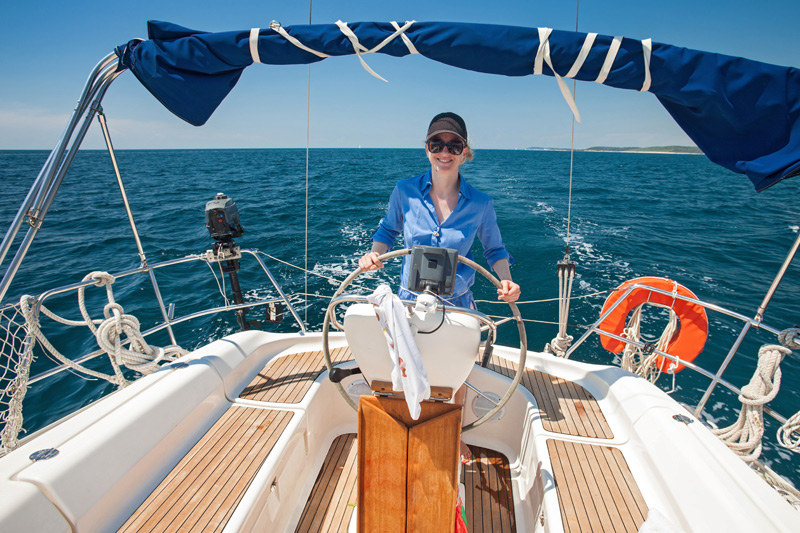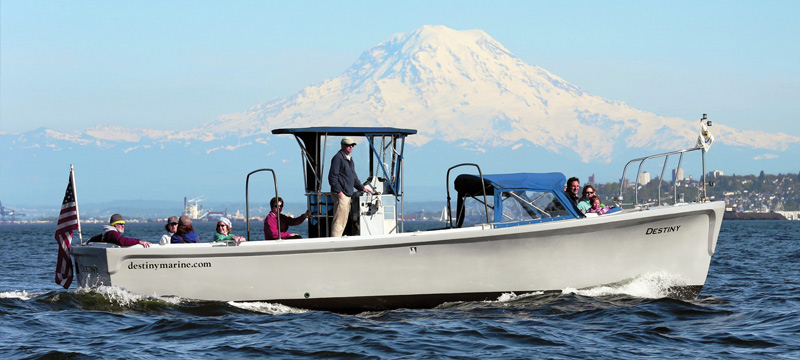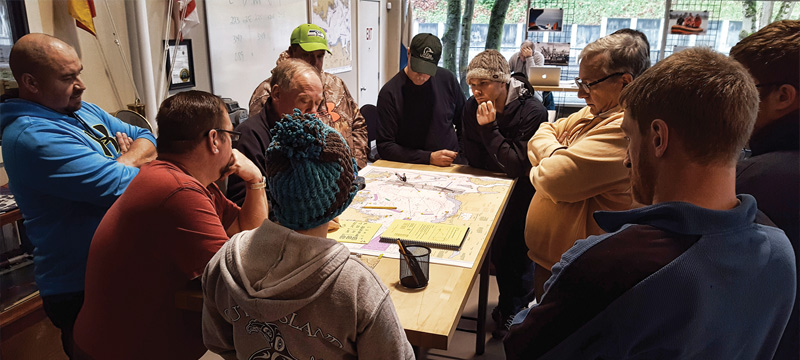
 As a boating instructor and lifelong mariner, I’ve grown to see the voyage to becoming captain is as much about cultivating a philosophy as it is about logging a certain number of miles or passing exams. Being Captain is less about receiving a license and more about becoming one with oneself, others, and nature. In my efforts to categorize the different elements of becoming captain, I turn to metaphor: bricks versus mortar.
As a boating instructor and lifelong mariner, I’ve grown to see the voyage to becoming captain is as much about cultivating a philosophy as it is about logging a certain number of miles or passing exams. Being Captain is less about receiving a license and more about becoming one with oneself, others, and nature. In my efforts to categorize the different elements of becoming captain, I turn to metaphor: bricks versus mortar.
My use of the term “bricks” refers to the thousands of physical details that go into boating. Bricks refers to the “to do” or “to get” list that’s never fully done, the checklist that’s always growing, and frankly, the focus of most boaters. This is not where I want to take this dialogue. Instead, I’ll address what I call “mortar,” the essence that holds it all together. It is the mortar of boating that drives us to different levels of experiences and really (no, really!) is what we’re seeking in our insatiable passion for boating. With mortar in mind, here are two
approaches boaters take toward becoming Captain:
Some boaters “wing it” every time they get underway, counting on pure luck to serve them well time after time. The problem with that approach is that the Laws of Probability invariably catch up with them eventually, typically at the worst time, in the worst place, and usually in the worst way.
Imagine loving your avocation so much you delve deeply into every aspect that bears directly on your enjoyment of the sport. This approach will not only create a safer environment in which to operate, for yourself and for other boats/boaters around you, but also vastly improve your experience both on the water and alongside the dock.
Let’s compare these two approaches thematically:
Approach 1: “Are you kidding? I don’t need training.”
Approach 2: “Hey, perhaps I’ll learn something I can really use!”
Approach 1: “I pay my mechanic to handle that.”
Approach 2: “Please show me what to do, so I’ll know what to do in an emergency.”
Approach 1: “Hey, I’m the Skipper here! Stand back – I’ll handle this!”
Approach 2: “Here, let me share how to do that properly … it could make a difference if one of us gets hurt.”
Approach 1: “Hold my beer and watch this!”
Approach 2: Pace is everything – slow, assured, confident boat handling is the result of years of studied practice. A disciplined approach is a safer, happier bet.
In truth, luck is just that, luck. Time has a way of teaching us that inexperience, ignorance, and false bravado attract bad luck in a big way, while good sense, training, and a temperate, professional approach to boating attracts good luck in an equally big way. Bottom line? Neither physics nor the sea care about you. If you care about you, recognize here and now that the flavor of luck you earn is driven solely by the choices you make. In the spirit of facilitating good luck, I offer positive characteristics I associate with becoming captain.

Romance and the Sea: I do not refer to the passion between two people, but rather about our rampant, infectious fervor for boating fueled by our natural attraction to water. Just as in human relationships, the man-boat attraction can be tough to characterize. People naturally long to be close to moving water. Deception Pass, Multnomah Falls, and even dining at local waterfront restaurants are huge draws. Walking in the wet sand along the surf line in Grayland or Westport is seductive to most. Throw in sailing, fishing, waterskiing, cruising, diving, etc., and you get the idea. The mysterious attraction may actually enhance our experience with boats. That said, I still think it’s useful to pause once in a while to reflect on how you got where you did regarding boating. To me, the words “why” and “be” dig at the heart of our passion for the sea, and better influence what kind of captain you’ll end up being. Staying in that mindful conversation may better serve to fuel your passion, and could help you become a better captain.
Thirst for growth: Sharp boat operators are open to learning new things, yet also reinforce old principles while remaining open to mentoring. With the right training, whether afloat or in a classroom, you’ll likely be exposed to fresh ideas, tips, tricks, and techniques that you’ll find useful for years to come. Even if you consider a course too advanced or too tough, engage for all you’re worth – you may surprise yourself. Of course, additional training alone can’t guarantee that you’ll avoid disaster, but it should better your odds. Conversely, an untrained cavalier attitude may create a disturbing outcome that could in an instant change your entire perspective on what “should have been.” A periodic pause for training could save you a lifetime of regret.
Cast of characters: There are many skippers so enamored with themselves they imagine they are the model of perfect boating, as is, right out of the box, without even a lick of experience. These are arguably the most dangerous boaters on the planet, unwittingly relying on pure luck to return home safely at the end of the day. Grow your experience to a point where you are able to spot these fellas a full nautical mile away and steer clear.
At the opposite end of the spectrum, there are those lifelong boaters that relish every opportunity to be on the water, all the while respecting the elements, tending to the material condition of their vessel, exposing themselves to new ideas and initiatives, engaging in training at every opportunity to stretch their universe well beyond what they know they know, effusing courtesy to other boaters along the way on every voyage they undertake, sharing their experiences and experience with all those to whom it may matter, and cherishing every form of all things nautical — draw closer to these types.
Fortunately, we are blessed with countless good folk that function off the water, or in the periphery of our boating worlds. Examples range from the countless volunteers that run sailing regattas every year to the dad laboring over the brightwork on his old wooden classic so that his son may treasure those memories after he is gone. Connect with the right crowd, and you can continually work toward an ever-improving level of spatial awareness on the water, embrace a more powerful, integrated approach to boating, and have more fun.
Confidence through experience: As the old saying goes, good judgment comes from experience; experience comes from bad judgment. Bad judgment can only be fully exorcized by getting underway – classroom discussions alone will never suffice in the real world. Take in your mooring lines and stretch your experience envelope a bit by developing challenging voyage plans.
For starters there’s, the Operator of Uninspected Passenger Vessel, a.k.a. “six-pack” license. Fifty-six hours in the classroom, four examinations, done. Then you can choose to upgrade to the Master 25- (or) 50- (or) 100-ton license, depending on your sea service and experience on the water, to broaden your horizons further.
Why do it at all? Plenty of people come through the training for the professional grade instruction, which can really help insurance rates. Many, many agencies have sent officers through for a variety of reasons. For the most part, though, people are simply seeking another path for their lives. They’ve loved boating, and thought “what can I do with my experience afloat?” Many are tired of their humdrum careers and are anxious to shift gears. Earning your license can open up pathways you never even knew existed.
Some of the greatest benefits of taking a class alongside other mariners is sharing ideas, sharing dreams and aspirations, discovering new possibilities, and partnering for your future. Learn navigation, study rules of the road, and broaden your awareness of deck seamanship, but understand this: your training reaches far beyond course content and could well be a declaration of independence from a lifestyle in which society would leave you embroiled.
Sure, there is class work, a mighty volume of information to study, exams to pass, and paperwork to process. But that’s all only “stuff.” Don’t balk at the “stuff,” the bricks of boating. But remember the mortar, the essence and passion of boating, that holds it all together. Keep your eye on your goal and you’ll do great, Captain!
Guys love being in charge, whether or not they should be. Heck, “macho men” know how to switch on the radar then ignore it, steer the boat hard aground, start the engines without cooling water, plumb the head directly overboard, navigate without charts, tune the radio to the wrong channel, approach a mooring too fast, forget to turn on the navigation lights, care less about their wake, blame the fog for their mishap, and laugh when a passenger gets seasick. Being a regular guy is the single greatest impediment to learning there is.
I’ve personally struggled with the same affliction for decades. Hey fellas, consider letting the whole family take you for a drive on the water occasionally. This will take a good measure of trust, but you’ll likely be surprised by their capacity for handling themselves in a shipshape, squared away manner. Safer, smarter, better.
Steward of responsibility: August is here, and we’re all deep into all the waterborne events that go with it: long-awaited cruises north to the Wherever Islands, sailing regattas every weekend, powerboat rendezvous’ here and there, or fishermen hooking up with other fishermen to pursue their lifelong dreams. The combinations are endless. What fun! But then in a flash, the unthinkable happens and the dark side of boating rears its head. A classic (non-gory) example is the large 143-foot retired tug boat that ran aground just inside the R4 buoy off Shilshole Bay Marina. Its amateur crew found a “professional” shallow spot, then blamed the grounding on a faulty radar and fog — and even declared on Facebook the grounding was “through no fault of the crew.”
These mariners clearly can’t even grasp the notion of common sense, let alone the Laws of the Sea, especially regarding Captains ultimately taking responsibility no matter what.
When things go wrong on the water, the sequence of events leading to disaster is typically a series of poor decisions, omissions, or blunders. It is the skipper’s responsibility to manage these elements in advance to avert problems. Take the time to define your interpretation of responsibility for your actions, your crew, your planning, your conduct, your decisions, your preparedness, your attitude, and on and on and on. Doing so will earn you far more freedom for the structure and order you embrace, fun for all the effort you applied in advance, pride from your well-found preparedness, and ultimately, peace in knowing you’re on the right path.
Be deliberatve about doing that which is right: We must admit, for life to be in balance, for every plus there must be a minus, for every good a bad, for every right a wrong, for every angel a demon. The bottom line, then, is this: mariners need to be taught to operate effectively in that tiny confined space between good and bad. Do good, don’t do bad. Essentially, make better decisions from the standpoint of knowing what’s right, and take a powerful proactive stance against doing wrong.
To ignore the possibility of bad is wholly unrealistic. It’s a-l-w-a-y-s there, just across the water from good, waiting to pounce. Remember: the universe in balance.

Enduring vigilance: Imagine the possibility of elevating your boating to a different level, operating at a more enlightened stratum. When you are on the water, see the front and the back of the mirror; sense the dangers and the joys simultaneously. When you fish, consider carefully the moment; when you sail, be the wind and the water.
When approaching shoal water trust your senses to alert you and train until your instincts are consistently cradled in that sweet spot. The dangers are real, your responses should be certain to recognize and repel them. The joys are also real, your senses better equipped to embrace them. Life will invariably present you with both sides of this balanced equation – deal with it.
If you’re the captain, for goodness sakes be the Captain, for there can be only one. Study, train, practice, respect the elements, examine your charts, know your boat, understand your limitations, discuss potential dangers, and embrace your responsibilities, yet always maintain a sharp lookout for pure joy, for it’s there in abundance. And as with all lookouts, actual or philosophical, you have a duty to see what can be seen.
A few years ago, my wife Jan and I were stunned by a child sailing his OPTI sailboat in a youth regatta held in the Center Sound. He was trailing the rest of the fleet by a quarter-mile, yet did he care? As he quietly passed, you could clearly tell this was before this young fella grasped the idea of winning or losing, before he knew it was somehow important to sail really, really fast, before he was taught it was important to keep up. He was as content as content could be, and I was shaken to my boating core. This moment remains seared into my mind as utter proof of our natural love of boating. Do you remember this sensation? Too few people slow down long enough to do so. This natural harmonic resonance is the why of being on the water, in the water, and about the water. Witnessing this child sail by us sent the following message loud and clear: constantly reclaim your reason and never forget your love.
Boating provides opportunities for life-changing moments. Paths carefully selected and followed wisely can lead to profound fulfillment, and for a moment, everything is in balance. We now have lifelong memories with which we can regale our friends and families, sharing our special circumstance, our excitement, our life lesson, our new-found inner peace, and our bliss.
Whatever your intentions or your path, however, just know this at some point your dreams will be beyond your reach. Time has its way of narrowing your options. And, more sadly, even if you fulfill your dream, at some point it will end. But if you’ve played big – really, really big – when reality all too soon whispers “it’s over” quietly into your heart, you won’t be dismayed; you’ll be grateful for the power of your dreams, Captain.